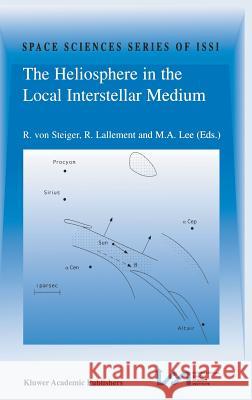The Heliosphere in the Local Interstellar Medium: Proceedings of the First Issi Workshop 6-10 November 1995, Bern, Switzerland » książka
The Heliosphere in the Local Interstellar Medium: Proceedings of the First Issi Workshop 6-10 November 1995, Bern, Switzerland
ISBN-13: 9780792343202 / Angielski / Twarda / 1996 / 399 str.
The Heliosphere in the Local Interstellar Medium: Proceedings of the First Issi Workshop 6-10 November 1995, Bern, Switzerland
ISBN-13: 9780792343202 / Angielski / Twarda / 1996 / 399 str.
(netto: 575,06 VAT: 5%)
Najniższa cena z 30 dni: 578,30
ok. 22 dni roboczych
Bez gwarancji dostawy przed świętami
Darmowa dostawa!
In summary, we can conclude that the contributions of the different ionization processes to the total ionization rate for the most abundant interstellar species are basically known. The ionization of the noble gases He and Ne is almost completely dominated by photoionization, whereas for H charge-exchange with the solar wind is most important. For other species, such as 0 and Ar, both processes contribute significantly. Electron impact ionization can typically contribute by '" 10% to the total rate in the inner Solar System. Because direct measurements of the solar EUV flux are not yet continuously available, the variation of the ionization rate over the solar cycle still contains a relatively large uncertainty. The recent measurements of pickup ion distributions and of the neutral helium gas provide an independent tool to determine the total ionization rate that can be used to cross calibrate with the results obtained for the individual ionization processes. Acknowledgements The authors are grateful to M. Allen for supplying us with new data on photoioniza tion cross-sections compiled by him. We thank also M. Gruntman for drawing our attention to and support in collecting the most recent data on charge-exchange cross-sections. D. R. was supported by grant No. 2 P03C. 004. 09 from the Com mittee for Scientific Research (Poland). This work was also supported in part through NASA contract NAS7-918, NSF Grant INT-911637, NASA Grant NAGW- 2579.











